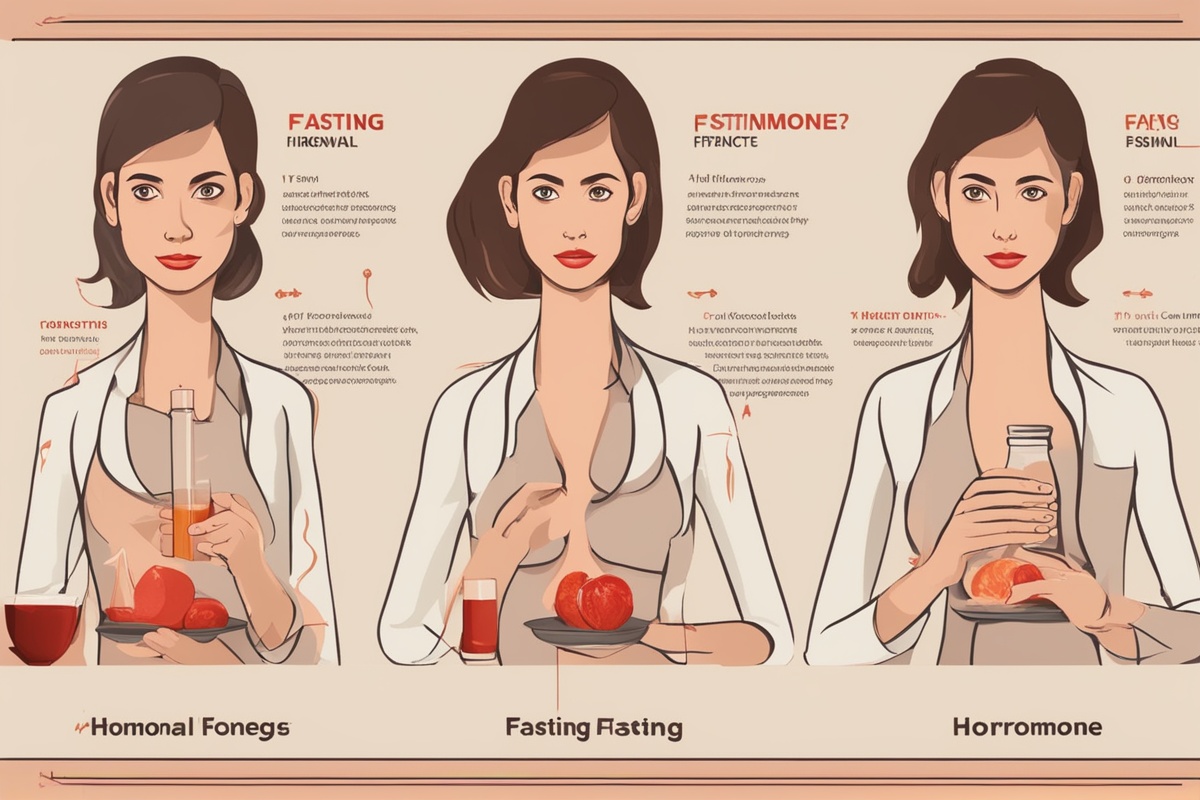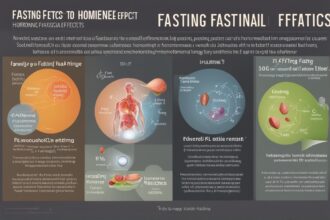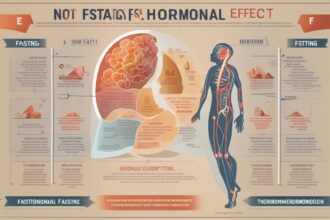Hey there, health enthusiasts! If you’ve been exploring ways to optimize your wellness, you’ve likely stumbled upon the buzz around intermittent fasting (IF). Beyond weight loss, one of the most compelling reasons to try fasting lies in its profound hormonal effects. Today, we’re diving deep into the fasting hormonal benefits and uncovering how this ancient practice can recalibrate your body’s internal systems for better energy, metabolism, and even mental clarity. Whether you’re a seasoned faster or just curious about how skipping a few meals could transform your health, stick with me as we break down the science and share practical tips to harness these benefits.
What Are Fasting Hormonal Benefits?
Let’s start with the basics. Fasting, particularly intermittent fasting, isn’t just about cutting calories—it’s a powerful tool that influences your body’s hormonal balance. When you fast, your body shifts from a fed state to a fasting state, triggering changes in key hormones like insulin, cortisol, and human growth hormone (HGH). These fasting hormonal benefits can improve metabolic health, reduce inflammation, and even support cellular repair. Research shows that fasting can enhance insulin sensitivity and lower blood sugar levels, which is a game-changer for managing or preventing type 2 diabetes (Barnard et al., 2019). So, how does this hormonal magic happen? Let’s explore the specific hormones affected by fasting.
Insulin Sensitivity: A Key Fasting Hormonal Benefit
One of the most well-documented effects of fasting is its impact on insulin, the hormone responsible for regulating blood sugar. When you eat, insulin spikes to shuttle glucose into cells for energy. But constant snacking or overeating can lead to insulin resistance, where cells stop responding to the hormone, increasing the risk of diabetes. Fasting flips the script. By giving your body a break from food, insulin levels drop, allowing cells to become more sensitive to it. Studies have shown that intermittent fasting can reduce fasting insulin levels by 20–31% in some individuals (Halberg et al., 2005). This means your body uses insulin more efficiently, stabilizing blood sugar and reducing cravings—a win for anyone looking to manage weight or energy levels.
Practically speaking, you can maximize this benefit by sticking to a consistent fasting schedule, like the 16:8 method (fast for 16 hours, eat during an 8-hour window). Pair this with a balanced diet low in refined sugars to keep insulin levels in check even during eating periods.
Human Growth Hormone: Boosting Repair and Recovery
Another exciting aspect of fasting hormonal benefits is the surge in human growth hormone (HGH). HGH plays a crucial role in cell regeneration, muscle growth, and fat metabolism. When you fast, especially for extended periods (like 24 hours or more), HGH levels can increase dramatically—sometimes by as much as fivefold (Ho et al., 1988). This spike supports tissue repair, boosts fat burning, and may even slow aging processes. For those into fitness, this can translate to better recovery after workouts and improved muscle retention during weight loss.
Curious how to tap into this? Try incorporating occasional longer fasts (with medical supervision if you’re new to fasting) or cycle between different fasting protocols to keep your body guessing. Just remember to stay hydrated and listen to your body—HGH benefits aren’t worth pushing past your limits.
Cortisol and Stress: Finding Balance Through Fasting
Now, let’s talk about cortisol, often dubbed the “stress hormone.” Cortisol isn’t all bad—it helps regulate metabolism and your fight-or-flight response. However, chronic high levels from stress or poor diet can wreak havoc on your body, leading to weight gain and fatigue. Fasting has a nuanced effect on cortisol. In the short term, it may increase cortisol as your body adapts to the stress of not eating (Cahill, 2006). But over time, regular fasting can help regulate cortisol rhythms, potentially reducing overall stress when paired with mindfulness practices. This is one of those fasting hormonal benefits that requires patience and consistency to fully experience.
If you’re worried about cortisol spikes, start with shorter fasting windows and avoid overdoing caffeine, which can amplify stress responses. Also, prioritize sleep—poor rest can sabotage cortisol regulation no matter how well you fast.
Other Hormonal Shifts: Ghrelin, Leptin, and Beyond
Beyond insulin, HGH, and cortisol, fasting also tweaks hunger hormones like ghrelin and leptin. Ghrelin, the “hunger hormone,” often increases during fasting, signaling it’s time to eat. But here’s the cool part: over time, fasting can recalibrate ghrelin levels, reducing overall hunger pangs as your body adapts (Cummings et al., 2002). Leptin, the “satiety hormone,” tells your brain you’re full, and fasting may improve leptin sensitivity, helping you feel satisfied with less food. These subtle shifts contribute to the broader fasting hormonal benefits that make IF a sustainable lifestyle choice for many.
Plus, fasting can influence other systems, like reducing inflammatory markers tied to hormonal imbalances (Farooq et al., 2020). It’s like giving your body a reset button—pretty amazing, right? Let’s look at some actionable ways to integrate fasting for hormonal health.
Practical Tips to Maximize Fasting Hormonal Benefits
Ready to put this knowledge into action? Fasting doesn’t have to be intimidating, and with a few smart strategies, you can optimize the hormonal perks. Here are some beginner-friendly tips to get started:
- Start Small: If you’re new to fasting, begin with a 12:12 schedule (12 hours fasting, 12 hours eating) before progressing to 16:8 or other protocols.
- Stay Hydrated: Dehydration can mimic hunger and stress your hormones, so sip water, herbal tea, or black coffee during fasting windows.
- Focus on Nutrient Timing: Break your fast with protein and healthy fats to stabilize blood sugar and support hormonal balance.
- Avoid Overtraining: Intense exercise during long fasts can spike cortisol, so opt for light activity like walking or yoga until you’re adapted.
Once you’re comfortable, consider tweaking your approach based on your goals. Want more HGH? Experiment with a 24-hour fast once a month. Aiming for insulin sensitivity? Keep carbs moderate during eating windows. Personalization is key.
Potential Pitfalls and How to Avoid Them
While the fasting hormonal benefits are impressive, fasting isn’t a one-size-fits-all solution. Some folks might experience hiccups, especially if they dive in too quickly or ignore their body’s signals. Here are a few common challenges and how to sidestep them:
- Hormonal Imbalance Risks: Women, in particular, may experience disruptions to menstrual cycles if fasting is too extreme, due to impacts on reproductive hormones (Martin et al., 2018). Ease in slowly and consult a healthcare provider if needed.
- Overeating Post-Fast: Binging after fasting can undo insulin benefits, so plan balanced meals ahead of time.
- Fatigue or Irritability: Low energy during early fasting attempts is normal as hormones adjust—give it a week or two, and ensure adequate sleep.
- Medical Conditions: If you have diabetes or other hormonal disorders, fasting without guidance can be risky. Always check with a doctor first.
The takeaway? Fasting can be a powerful tool for hormonal health, but it’s not about pushing yourself to extremes. Listen to your body, and don’t hesitate to seek professional advice if something feels off.
So, what’s the big picture? The fasting hormonal benefits are real and backed by science, offering a natural way to fine-tune your body’s systems. From improved insulin sensitivity to boosted growth hormone and better stress regulation, intermittent fasting can be a game-changer for your health. But it’s not just about skipping meals—it’s about adopting a mindful approach that fits your lifestyle. Start small, stay consistent, and experiment with what works for you. Remember, health isn’t a sprint; it’s a journey. Have you tried fasting yet? Drop a comment below with your experiences or questions—I’d love to hear how it’s working for you! Let’s keep this conversation going and support each other in unlocking the full potential of fasting for hormonal wellness.
References
- Barnard, N. D., Levin, S. M., & Yokoyama, Y. (2019). A systematic review and meta-analysis of changes in body weight in clinical trials of vegetarian diets. Journal of the Academy of Nutrition and Dietetics, 119(5), 791-802. https://doi.org/10.1016/j.jand.2018.11.016
- Halberg, N., Henriksen, M., Söderhamn, N., et al. (2005). Effect of intermittent fasting and refeeding on insulin action in healthy men. Journal of Applied Physiology, 99(6), 2128-2136. https://doi.org/10.1152/japplphysiol.00683.2005
- Ho, K. Y., Veldhuis, J. D., Johnson, M. L., et al. (1988). Fasting enhances growth hormone secretion and amplifies the complex rhythms of growth hormone secretion in man. Journal of Clinical Investigation, 81(4), 968-975. https://doi.org/10.1172/JCI113450
- Cahill, G. F. (2006). Fuel metabolism in starvation. Annual Review of Nutrition, 26, 1-22. https://doi.org/10.1146/annurev.nutr.26.061505.111258
- Cummings, D. E., Purnell, J. Q., Frayo, R. S., et al. (2002). A preprandial rise in plasma ghrelin levels suggests a role in meal initiation in humans. Diabetes, 50(8), 1714-1719. https://doi.org/10.2337/diabetes.50.8.1714
- Farooq, N., Priyamvada, S., Arivarasu, N. A., et al. (2020). Influence of Ramadan-type fasting on carbohydrate metabolism, cardiovascular risk factors and oxidative stress in type 2 diabetes. Diabetes Research and Clinical Practice, 160, 107997. https://doi.org/10.1016/j.diabres.2019.107997






